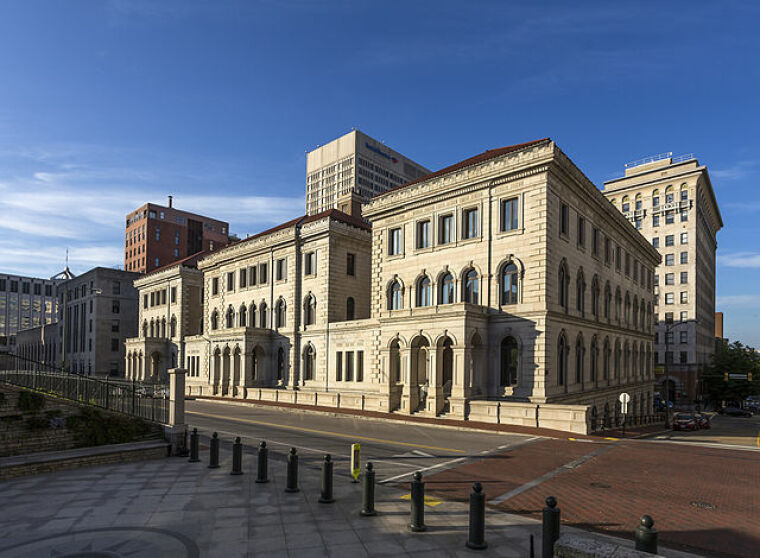Federal court strikes down Christian-only prayer at commission meetings in North Carolina

A federal court has ruled that the practice of opening commission meetings in North Carolina with Christian prayers and inviting the audience to join violates the U.S. Constitution.
In a 10–5 decision on Friday, the Fourth Circuit Court of Appeals upheld a lower court ruling that found the prayers practiced by the Rowan County Board of Commissioners to be "unconstitutionally coercive."
The lawsuit against the county was filed by the American Civil Liberties Union (ACLU) on behalf of non-Christian residents who said they felt excluded by the prayers.
The Supreme Court has already ruled that it is appropriate for local clergy to deliver predominantly Christian prayers at meetings in limited circumstances, according to Fox News. But in the case of Rowan County, the court weighed whether the prayers were delivered by the elected-commissioners themselves and whether their invitation for the audience to join was coercive.
"The prayer practice served to identify the government with Christianity and risked conveying to citizens of minority faiths a message of exclusion," Judge J. Harvie Wilkinson wrote in the majority opinion.
Judge Paul Niemeyer, in his dissenting opinion, contended that the decision "actively undermines the appropriate role of prayer in American civil life."
"In finding Rowan County's prayer practice unconstitutional, essentially because the prayers were sectarian, the majority's opinion strikes at the very trunk of religion, seeking to outlaw most prayer given in government assemblies, even though such prayer has been an important part of the fabric of our democracy and civic life," he wrote, as reported by The Associated Press.
The full Fourth Circuit decided to hear the case in March after a divided three-judge panel ruled that the commissioners had a constitutional right to open meetings with prayer as long as audience members are not pressured to participate.
The ACLU argued that the commissioners directed the public to participate in the prayers, by using phrases such as "please pray with me." The law group also claimed that the commissioners also used language that can be seen as proselytizing, like "I pray that the citizens of Rowan County will love you, Lord."
The attorneys for Rowan County, however, contended that the commissioners do not force anyone to participate, noting that anyone can leave the room or stay seated during the prayer. A volunteer chaplain has been invited to lead the prayers after the lower court decision deemed the practice unconstitutional.
Chris Brook, legal director for ACLU of North Carolina, described Friday's ruling as a "great victory for the rights of all residents to participate in their local government without fearing discrimination."
First Liberty Institute, one of the firms representing the county, noted that it is up to the commission whether to appeal. Mike Berry, deputy general counsel for the law firm, said he believes the case is ripe for Supreme Court review because it conflicts with the justices' prior rulings.
 Christians don't have to affirm transgenderism, but they can’t express that view at work: tribunal
Christians don't have to affirm transgenderism, but they can’t express that view at work: tribunal Archaeology discovery: Medieval Christian prayer beads found on Holy Island
Archaeology discovery: Medieval Christian prayer beads found on Holy Island Presbyterian Church in America votes to leave National Association of Evangelicals
Presbyterian Church in America votes to leave National Association of Evangelicals Over 50 killed in 'vile and satanic' attack at Nigerian church on Pentecost Sunday
Over 50 killed in 'vile and satanic' attack at Nigerian church on Pentecost Sunday Ukrainian Orthodox Church severs ties with Moscow over Patriarch Kirill's support for Putin's war
Ukrainian Orthodox Church severs ties with Moscow over Patriarch Kirill's support for Putin's war Islamic State kills 20 Nigerian Christians as revenge for US airstrike
Islamic State kills 20 Nigerian Christians as revenge for US airstrike Man who served 33 years in prison for murder leads inmates to Christ
Man who served 33 years in prison for murder leads inmates to Christ


 Nigerian student beaten to death, body burned over ‘blasphemous’ WhatsApp message
Nigerian student beaten to death, body burned over ‘blasphemous’ WhatsApp message 'A new low': World reacts after Hong Kong arrests 90-year-old Cardinal Joseph Zen
'A new low': World reacts after Hong Kong arrests 90-year-old Cardinal Joseph Zen Iran sentences Christian man to 10 years in prison for hosting house church worship gathering
Iran sentences Christian man to 10 years in prison for hosting house church worship gathering French Guyana: Pastor shot dead, church set on fire after meeting delegation of Evangelicals
French Guyana: Pastor shot dead, church set on fire after meeting delegation of Evangelicals ‘Talking Jesus’ report finds only 6% of UK adults identify as practicing Christians
‘Talking Jesus’ report finds only 6% of UK adults identify as practicing Christians Mission Eurasia ministry center blown up in Ukraine, hundreds of Bibles destroyed: 'God will provide'
Mission Eurasia ministry center blown up in Ukraine, hundreds of Bibles destroyed: 'God will provide' Church holds service for first time after ISIS desecrated it 8 years ago
Church holds service for first time after ISIS desecrated it 8 years ago Burger King apologizes for 'offensive campaign' using Jesus' words at the Last Supper
Burger King apologizes for 'offensive campaign' using Jesus' words at the Last Supper Uganda: Muslims abduct teacher, burn him inside mosque for praying in Christ’s name
Uganda: Muslims abduct teacher, burn him inside mosque for praying in Christ’s name